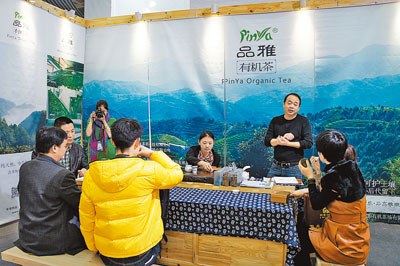|
Cathy Mo
mchengmail@tom.com
ORGANIC tea became a bright spot at the 9th Shenzhen Tea Expo, with an increasing number of organic tea makers and consumers attending the four-day event.
The 9th (Shenzhen) International Tea Industry Expo, which concluded yesterday at Shenzhen Convention and Exhibition Center, saw a dozen organic tea makers showing up, 11 more than last year, according to Li Dabing, a sales manager with Shenzhen Huajuchen Industry Co. Ltd., organizer of the expo.

“More tea makers are aware of the rising demand from customers for better quality drinks as Chinese people are getting better off, so some are shifting to organic,” Li said yesterday.
China, the world’s top tea producer, produced 1.89 million tons of tea in 2013, of which organic products only took up a small proportion, according to a report by China Tea Marketing Association earlier this year.
The concept of “organic tea” emerged and developed in China in the early 1990s and gradually gained public acceptance in the early 2000s.
“After more than 20 years of development, the total plantation area for organic tea had reached 35,000 hectares in China by the end of 2012. The 400-odd certified organic tea producers currently generate some 28,000 tons of the product per year,” said Wang Jianren, board chairperson of Xiamen Pinya Organic Tea Technology Co. Ltd. and president of the organic branch of the tea association in Fujian Province’s Anxi County, an important base for China’s Oolong Tea.
Wang, who became engaged in the organic tea business 10 years ago, now manages some 12,000 mu (800 hectares) of tea in Anxi County, 2,000 mu of which are reserved for organic planting.
“Compared with ordinary tea, organic growing requires more time, more technology and more labor, all of which equals more money. Before selling organic tea, the grower must apply for special national certification for all its growing, manufacturing and storage procedures. We need certificates not only for raw materials, but also for processing and trading,” Wang said.
Deng Lushan, the general manager of Hunan Qianqiujie Tea Co. Ltd. who is transforming 3,500 mu of his mountainous farms above 1,000 meters in altitude in Hunan Province’s Anhua into organic fields, said Thursday that he employs more than 200 laborers during peak periods.
“With the growing demand for safer food amid environment problems in the country, people are more concerned with what they drink. If tea farmers neglect this demand, they will lag behind the consumption trend,” Deng said.
Another organic dark tea grower, Wang Renqing, general manager of Hunan Ziranyun Dark Tea Technology Co. Ltd., said his company is investing 400 million yuan (US$64.72 million) in building 200,000 mu of plantations, aiming at becoming the biggest organic belt in China. Wang’s output is expected to reach 4 million kilograms this year and 22 million kilograms next year.
Wang Hong, a middle-aged Shenzhen woman who is an organic tea lover, said it was difficult for her to find organic tea a few years ago. Even now, there are still “not many” brands she considers “real and good” on the market.
Pinya’s Wang said China’s organic tea sector has come to a crossroad, facing both rising demand and increasing problems. The sector is still small and fragmented with few varieties — and some people still don’t trust it.
“The market needs to be better managed and regulated. There is an urgent need for us to form a nationwide federation or association to unify standards and join efforts to solve these problems,” he said.
|

